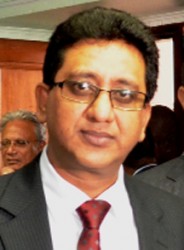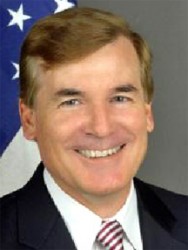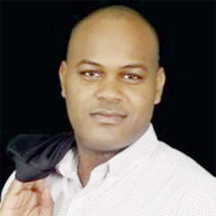United States Ambassador to Guyana Brent Hardt yesterday called for the National Broadcasting Authority to “promptly review and approve” qualified applicants for radio licences, even as Attorney General Anil Nandlall considered the possibility that the “right methodology” might not have been used in the allocations made by former president Bharrat Jagdeo.
Ambassador Hardt made the call in an address to media workers and others during an event at his residence to mark World Press Freedom Day, which is being observed today, and he noted the statements of concern by numerous international bodies, such as the International Press Institute (IPI) and the Association of Caribbean Media Workers (ACM), over licences granted in late 2011 by Jagdeo.
“The message from all these international and regional bodies is broadly consistent. Guyana has a solid foundation of press freedom, but can take further steps, particularly in defined criteria of approval of licences. I hope that when we meet again next May on this occasion, there will be real progress to celebrate towards an independent and pluralistic media landscape,” he said.

The Ambassador noted that issues of media freedom have recently been at the forefront of public discourse following the announcement in Parliament of the names of the radio licence holders granted licences in late 2011. He said that last year he welcomed the decision by the government to free up the radio waves and end the model of limited, state-influenced radio, but added that the process by which such licences are issued “must be fair and transparent.”
“Guyana created a reasonable foundation for such a process through its 2011 Broadcast legislation, which paved the way for the creation of the National Broadcasting Authority. It is now time for the Authority to do its work – to promptly review and approve qualified applicants, including many long established media houses whose applications in various forms have been pending since the late 1990s,” he said.
“Such progress will contribute to what we recognized in our recent Human Rights report as an environment that broadly provides for freedom of expression and in which the government generally respects this right to practice,” he added.
The Ambassador noted that the US Human Rights report highlighted the continuing restrictions on radio broadcasting and the government’s continued exercise of control over the content of NCN TV, which gives government spokespersons extended coverage while limiting participation of opposition figures.
He said that the United States greatly values the freedom of the press as a key component of democratic governance. He said that democratic societies, including the US, are not infallible but they are accountable to their citizens. “While we may not be perfect, we have no shortage of media houses of all viewpoints to call attention to those imperfections and demand better,” he said. “This is why the free exchange of ideas is the foundation of accountable governance. In the United States, Guyana and countries around the world, the press fosters active debate, provides investigative reporting and serves as a forum to express differing points of views,” he added.


Hardt also said that legal mechanisms such as criminal libel laws can be misused to intimidate journalists as they risk being sent to prison simply for doing their job of investigating and reporting on matters of public interest. “The United States supports the recent initiative by the International Press Institute to encourage countries through the Caribbean region to repeal such laws and we welcome the positive signals provided by both the Government and Opposition in Guyana to do so,” he said. “Beyond criminal libel, even civil libel cases can generate legal fees that can often bankrupt individuals being sued,” he said.
In addition to criticism, the controversial granting of the radio licences by Jagdeo has been challenged by two separate court actions, which seek to have them overturned.
Speaking at the event yesterday in the place of an absent President Donald Ramotar, Nandlall considered that the method used to distribute the licences might have been wrong, but argued that those who benefitted cannot be faulted because of those who did not.
“Some 10 permissions have been granted to persons to operate. I have examined the applicants granted licences and in my view, there is a geographic spread. I have looked at the ethnic composition of the grantees because that has been made an issue and again I see an even spread,” he said.
“But what is fundamental is that we cannot fault the grantees for the no-grant to other applicants. Significant from the evidence that I have seen, these applications were all reviewed and a decision made. Perhaps the right methodology was not employed. But those are matters that will come out in the court proceedings and hopefully will put that issues to rest,” said Nandlall.
Nandlall said that freedom of the press is recognised as an indispensable part of Guyana’s democracy and a fundamental ingredient to the social and economic welfare of the country.
Also speaking at the event, President of the Guyana Press Association Gordon Moseley noted that the theme of World Press Freedom Day is ‘Safe to Speak: Securing Freedom of Expression in the Media,’ and posed the question what it is that the media have to secure.
“We must see every commemoration of World Press Freedom Day as an opportunity to remind us of the need to protect and secure that ultimate right,” he said. He noted that Guyana’s Constitution does not give an explicit clause or article recognising freedom of the press. “Guyana needs to be reminded that our constitutional right to freedom of expression is limited by several pronouncements under the same clause that gives us that right,” he said.
He said that the press must be vigilant that all its views are expressed in a fair, balanced and objective manner that redounds to the greater good of society. He said that there should be no crowding out of views in a multi, ethnic and multi-cultural society.





